Modern Foreign Languages Policy
advertisement
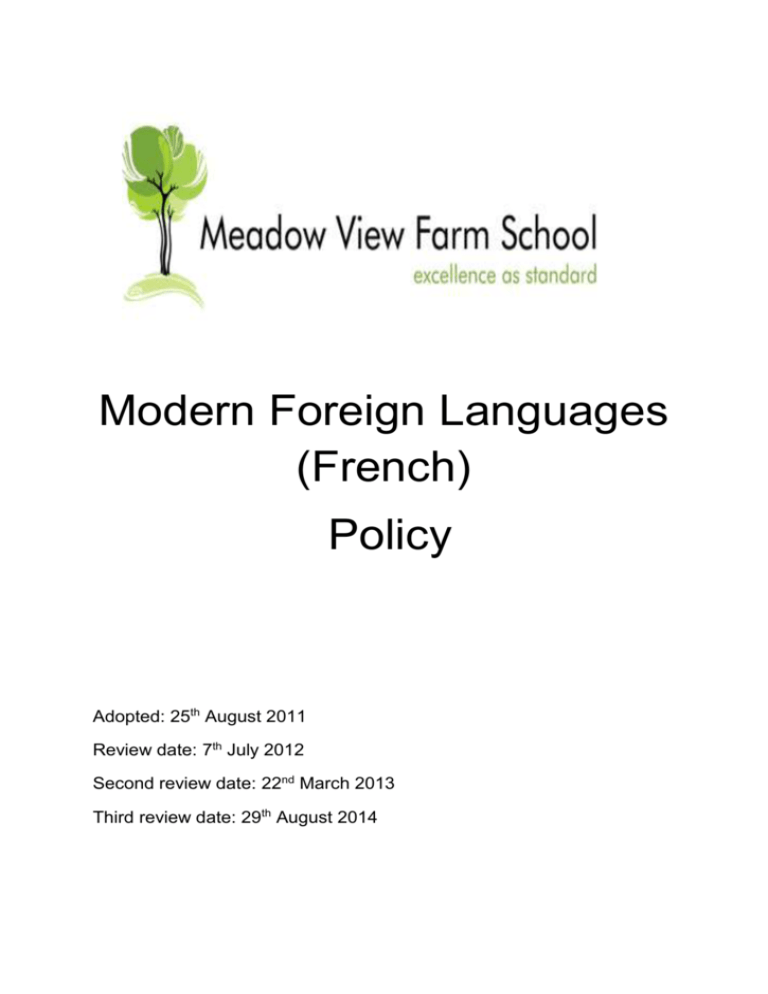
Modern Foreign Languages (French) Policy Adopted: 25th August 2011 Review date: 7th July 2012 Second review date: 22nd March 2013 Third review date: 29th August 2014 Meadow View Farm School Modern Foreign Languages (MFL) Policy Introduction This policy document sets out the school’s aims, principles and strategies for the delivery of Modern Foreign Languages in accordance with the 2014 primary curriculum document. It will form the basis for the development of languages in school. The study of languages prepares pupils to participate in a rapidly changing world in which work and other activities are increasingly carried out in languages other than English. Increased capability in the use of languages promotes initiative and independent learning and encourages diversity within society. Aims understand and respond to spoken and written language from a variety of authentic sources speak with increasing confidence, fluency and spontaneity, finding ways of communicating what they want to say, including through discussion and asking questions, and continually improving the accuracy of their pronunciation and intonation can write at varying length, for different purposes and audiences, using the variety of grammatical structures that they have learnt discover and develop an appreciation of a range of writing in the language studied. Principles The school believes that pupils learn more effectively if they are enjoying what they are doing. ICT is used to motivate pupils and to support good pronunciation. The school will be teaching French as its modern foreign language. Provide a rich and varied input of the language Use active learning to engage and motivate Integrate language learning across the curriculum to connect with learning in other subject areaslisten attentively to spoken language and show understanding by joining in and responding explore the patterns and sounds of language through songs and rhymes and link the spelling, sound and meaning of words engage in conversations; ask and answer questions; express opinions and respond to those of others; seek clarification and help* speak in sentences, using familiar vocabulary, phrases and basic language structures develop accurate pronunciation and intonation so that others understand when they are reading aloud or using familiar words and phrases* present ideas and information orally to a range of audiences* read carefully and show understanding of words, phrases and simple writing appreciate stories, songs, poems and rhymes in the language broaden their vocabulary and develop their ability to understand new words that are introduced into familiar written material, including through using a dictionary write phrases from memory, and adapt these to create new sentences, to express ideas clearly describe people, places, things and actions orally* and in writing understand basic grammar appropriate to the language being studied (French), including (where relevant): feminine, masculine and neuter forms and the conjugation of high-frequency verbs; key features and patterns of the language; how to apply these, for instance, to build sentences; and how these differ from or are similar to English. Teaching and Learning The school teaches French. The school uses ‘La Jolie Ronde’ scheme of work which has been developed to meet the criteria set out in the 2014 National Curriculum scheme of work. Pupils are taught in small class groups. The scheme is delivered in termly units after differentiation to meet pupil needs. Cross – Curricular links are exploited and enriched through timetabled school project and focus days together with other opportunities for curriculum enrichment. In general, teaching objectives are introduced in the order: Listen and understand Speak Read and understand Write Assessment Assessment takes place during each lesson and is used to: inform planning and ensure progression and achievement provide a basis for discussion with parents, carers and other staff Inform and provide evidence for annual reports. Subject Leader Role or SMT The subject leader or SMT will facilitate the use of Languages by: Updating the policy Ordering, updating resources Providing or organising CPD so staff are confident Keeping up to date with subject and national developments Taking an overview of whole school planning to ensure that pupils have opportunities to develop languages capability Ensure that progression is taking place Contributing to the school development plan (SDP) Monitoring the progress of individuals and the quality of teaching Health and Safety All staff should be aware of the health and safety requirements within the school and carry out risk assessments for activities, teaching areas, individual pupils and specific activities. Inclusion All pupils regardless of race, age or gender will have the opportunities to develop languages capability. The school will promote equal opportunities and access to resources. Pupils with other languages at home will be encouraged to use them for educational benefit. Suggested resources for the teaching of French La Jolie Ronde scheme of work Information on French artists Supervised use of internet to seek information and compare culture 2014 National Curriculum
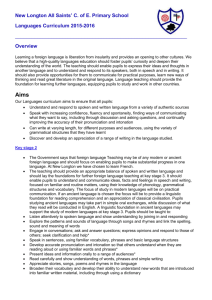
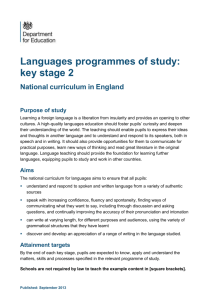


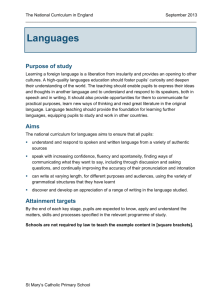
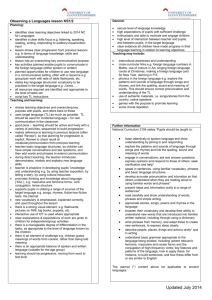
![afl_mat[1]](http://s2.studylib.net/store/data/005387843_1-8371eaaba182de7da429cb4369cd28fc-300x300.png)




